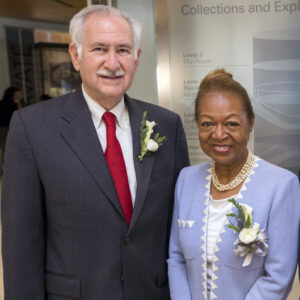
Peggy Newman, AB ’72, JD ’76, and Andy Newman
Robert S. Brookings Award
The Newmans are dedicated advocates for education and youth, with a long legacy of service to Washington University and the broader St. Louis community.
Andy currently serves as chair of Hackett Security Inc., a St. Louis-based electronic security firm. He previously was chair and CEO of restaurant groups such as Dave & Buster’s and Race Rock International. Prior to that, he was co-CEO of Edison Brothers Stores, and, in 1980, he co-founded the St. Louis Business Journal and several similar weekly publications in other U.S. cities. Peggy is president of the “I Have a Dream” Foundation-St. Louis, a local branch of a national organization focused on increasing access to higher education, and she also leads the PandA Foundation, named for Peggy and Andy.
Through their volunteer leadership and the philanthropy of the Newman and Edison family foundations, including the Eric P. & Evelyn E. Newman Foundation and the Edison Family Foundation, the couple have played a major role in the expansion and enrichment of Washington University — particularly for the School of Medicine and University Libraries. They were key supporters of the 2016-18 renovation of Olin Library, establishing The Newman Tower of Collections and Exploration, a four-story glass structure that displays special collections, including a rare copy of The Declaration of Independencegiven to the university by the Newmans.
Moreover, their giving and leadership to the medical school has significantly advanced the school’s research and clinical outreach. Andy has been chair of St. Louis Children’s Hospital and the Children’s Discovery Institute, as well as a primary donor to Evelyn’s House, the pioneering BJC Hospice facility named after his mother, Evelyn. The Eric P. Newman Education Center at the Washington University Medical Center is named after his father.
In 2017, the family foundations created the Edison Family Center for Genome Sciences & Systems Biology, the first interdisciplinary biomedical center to be established at the School of Medicine. Most recently, they established the Newman Center for Gut Microbiome and Nutrition Research. The couple also have established the Newman Madagascar Research Fund to support the conservation and biodiversity efforts of the university’s Living Earth Collaborative, a partnership with the Saint Louis Zoo and the Missouri Botanical Garden.
In addition, they have made substantial investments in the Danforth University Center, a central gathering place on the Danforth Campus. They fund travel scholarships for students, faculty, and staff, and they are longtime, high-level patrons of the Annual Fund for Arts & Sciences, the School of Medicine, and the university at large.
Peggy and Andy are esteemed members of the St. Louis community who have been widely recognized for their achievements at WashU and beyond. In 1992, Peggy was honored with the St. Louis Women of Achievement Award. In 1999, Andy accepted the Second Century Award from the School of Medicine on behalf of the Edison and Newman families.
The Newmans are active volunteer leaders at WashU and in St. Louis. Andy — a trustee of the university since 1987 and chair of the Board of Trustees from 2019 to 2022 — served on the Arts & Sciences National Council and is a current member of the School of Medicine National Council, a role he has held since 1995. He also was a key member of the university’s COVID-19 Research Task Force. Peggy and Andy are both highly engaged in St. Louis civic affairs, between them having served on the boards of the Saint Louis Science Center, United Way, and Downtown St. Louis, to name just a few charitable organizations.
Peggy graduated Phi Beta Kappa from WashU in 1972, double-majoring in psychology and education, followed by a juris doctorate from the School of Law in 1976. Andy graduated from Harvard University with a Bachelor of Science in 1966 and a master’s degree in business administration in 1968.
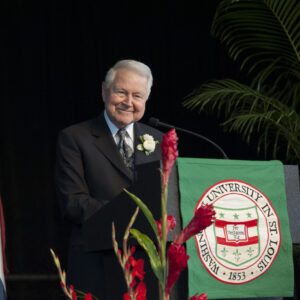
George P. Bauer, BS ’53, MS ’59
Distinguished Alumni Award
Chairman and CEO, GPB Group, LTD.
An emeritus trustee of Washington University, Bauer is an accomplished business leader and financier. Following a 31-year career at IBM, he now directs his own investment banking firm, GPB Group Ltd. Bauer joined IBM in 1956 and after training, became IBM manager for the McDonnell Aircraft account. His growing responsibilities at the company took him around the globe, including four years in Paris as group director of business systems for Europe, Africa, and the Middle East.
Bauer was a first-generation college student who attended WashU on a scholarship, and today, he pays his success forward by supporting the university’s top priorities. In 1989, he and his wife, Carol, established the Bauer Family Foundation, which focuses on improving education and human health worldwide. Together, they have a far-reaching philanthropic impact.
Bauer generously contributes his time and treasure to WashU. He has served as a member of the Olin Business School National Council since 2008, and he and Carol have invested considerably in student scholarships and professorships, establishing an endowed deanship at the School of Medicine and an endowed professorship focused on organizational governance and ethics at Olin Business School.
The couple are passionate about cultivating the next generation of principled business leaders: They created the George and Carol Bauer Leadership Center at Olin Business School and the George and Carol Bauer Leaders Academy for the Danforth Scholars. Through their foundation, they provided major capital funding to enable the construction of Bauer Hall.
Bauer earned a bachelor’s degree in industrial engineering from the McKelvey School of Engineering in 1953. He went on to earn a master’s degree from the Sever Institute, McKelvey Engineering’s graduate education department, in 1959. He and Carol have received numerous honors at WashU and beyond, including the 2011 Robert S. Brookings Award and honoree doctorate degree in 2019.

Andrew Chee-Yuen Chan, MD ’86, PhD ’86
Distinguished Alumni Award
Senior Vice President for Research Biology, Genentech
Chan is a pioneering researcher in immunology with an impressive track record of translating science in the laboratory to innovative therapies. He has contributed to breakthrough discoveries in autoimmunity and cancer immunotherapy, is a leading implementer of precision medicine strategies, and co-invented a drug that has profoundly affected the treatment of multiple sclerosis.
For over the past decade, Chan has overseen biological research at Genentech Inc., a San Francisco-based biotechnology company that advances drug discovery for life-threatening diseases. He also serves as an adjunct associate professor of medicine at the University of California San Francisco. Prior to joining Genentech, Chan led an illustrious academic career at Washington University, where he was an associate investigator of the Howard Hughes Medical Institute and an associate professor of internal medicine and of pathology.
Chan stands out as a dedicated mentor to future generations of physician-scientists, earning WashU’s Special Recognition Award for Mentoring Graduate Students in 2000. Since 2016, he has served on the School of Medicine National Council. He is also involved with the Arthritis Foundation, holding positions on its national advisory board and workforce development committees, among other roles.
Chan earned his undergraduate and master’s degrees in chemistry from Northwestern University, went on to study cellular and developmental biology at WashU’s School of Medicine, internal medicine residency at Barnes Hospital and his rheumatology fellowship training at UCSF. He has been recognized as a distinguished alumnus by all three institutions and has received numerous honors including election to the American Association of Physicians, American Society of Clinical Investigation, the 2021 Lee Howley Sr Prize and the 2012 Guin Warnock Award from the Arthritis Foundation and the 2013 Chairman’s Award of Distinction from the American Federation for Aging Research.
Andrea J. Grant, AB ’71, JD ’74
Distinguished Alumni Award
Senior Counsel, DLA Piper
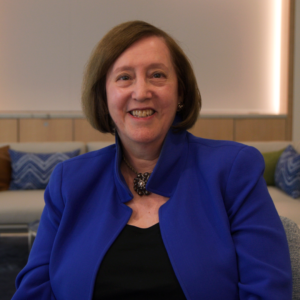
Grant is a renowned attorney who specializes in energy and the environment. At DLA Piper, a global law firm, she concentrates on legislation and regulations applicable to the petroleum industry. Previously, she was a partner at Verner Liipfert Bernhard McPherson & Hand LLC.
Grant has extensive experience representing independent marketers, refiners of petroleum products and has advised Congress on issues such as transportation, international trade, and taxes. She has practiced before a variety of federal agencies, including , the Environmental Protection Agency, U.S. Departments of Energy and Transportation, and the United States Coast Guard. During the early 1970s, she played a key role in helping to establish and implement petroleum policy in the U.S.
An emerita trustee of the university, Grant is an active and dedicated alumna. She has served on the Washington University Law National Council since 2014 and the Arts & Sciences National Council since 2004. In addition, she is chair of the Washington-Baltimore Regional Cabinet. Grant and her husband, Selig “Sandy” Merber, are longtime supporters of student scholarships and have established named, endowed funds. For more than a decade, the couple has contributed to the WashU Annual Fund at the Danforth Circle Chancellor’s Level.
Grant earned her bachelor’s degree in history from WashU in 1971; she graduated from the School of Law with her juris doctor in 1974. In 2011, the law school recognized her with a Distinguished Alumni Award. In 2016 she was awarded the Dean’s Medal from the College of Arts and Sciences and in 2018, she received the Washington-Baltimore Regional Award. Her legacy at WashU continues through her daughter, Erica Merber Murphy, AB ’07, and her son-in-law, Timothy Curtis Murphy, AB ’07.

Nina Leigh Krueger, MBA ’94
Distinguished Alumni Award
CEO, Nestlé Purina Petcare North America
Krueger is an expert marketing leader who is the first woman CEO of Nestlé Purina PetCare. A skillful businesswoman, she led a nearly 30-year career at the company prior to this latest appointment.
Krueger launched her storied career at Purina as a brand management intern while still a graduate student at Olin Business School. During her tenure there, she brought innovation to market with several successful brands and effectively integrated two marketing departments when Nestlé acquired Purina in 2001.
Krueger earned her bachelor’s degree in 1983 from Miami University in Oxford, Ohio, and graduated from Olin with a master’s degree in business administration in 1994. Since earning her MBA, she has remained closely engaged with the next generation of WashU business students: She delivered a keynote Commencement address, mentors women students, and has contributed her expertise as a special guest on Olin’s “On Principle” podcast and as a lecturer for the school’s “Defining Moments” course. She also is well-connected to the alumni community, serving on the Olin Alumni Association and class reunion committee.
In addition to service, Krueger is a generous financial supporter of Olin. She has invested in student scholarships and consistently contributes to the school’s Annual Fund. In her role at Nestlé Purina, she oversees the company’s philanthropy to WashU, including its sponsorship of the McDonnell International Scholars Academy and its support for the Africa Fund at the Institute for Public Health.
Krueger generously lends her time and treasure to civic organizations in St. Louis. Currently, she serves on the board of directors of St. Louis Children’s Hospital and the St. Louis Community Foundation, among others. She also has been an impactful volunteer leader at the International Institute of St. Louis.
Olin honored Krueger with a Distinguished Alumni Award in 2017.

Harry V. Moppins, Jr., BS ’67
Distinguished Alumni Award
Director of Music (Retired), Woodlawn Chapel Presbyterian Church
Moppins is a talented civic leader whose career demonstrates his strong commitment to the St. Louis region. He has been integral to advancing diversity and equity and helping to cultivate a culture of inclusive excellence at Washington University.
Since retiring, Moppins serves as the director of music at Woodlawn Chapel Presbyterian Church in Wildwood, Missouri. His multifaceted career also includes leadership roles at the St. Louis Minority Business Council, where he was director of member services, and the St. Louis Airport Authority, where he was director for community programs. In addition, he has held several senior-level positions in human resources at various Fortune 100 and 500 companies and privately held startups.
At WashU, Moppins is a trusted partner to both parents and senior university leaders concerning the needs and engagement of Black students and alumni. He was the St. Louis chapter chair of the Black Alumni Council (BAC) for more than two decades, during which time the council reestablished four additional chapters in other major metropolitan areas. Moppins has significantly boosted BAC’s scholarship funds through his personal philanthropy.
Moppins also dedicates time and talent toward the betterment of St. Louis. He has served on the board of directors of the Scholarship Foundation of St. Louis, a nonprofit that works to remove financial barriers to higher education, and of MERS Missouri Goodwill Industries, among other organizations. In 2006, WashU recognized his legacy of service with the Gerry & Bob Virgil Ethic of Service Award.
Moppins earned a bachelor’s degree in sociology from what is now WashU’s School of Continuing & Professional Studies (CAPS). Moppins is father to Matthew, Melissa “Missy” Moppins, MSW ’04, and has been married to his wife, Carol Moppins, MA ’74, for 53 years.
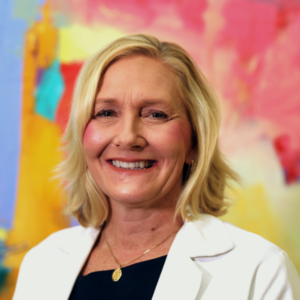
Eva M. Aagaard, MD
Distinguished Faculty Award
Carol B. and Jerome T. Loeb Professor of Medical Education
Senior Associate Dean for Education
Vice Chancellor for Medical Education
Washington University School of Medicine in St. Louis
Eva Aagaard, MD, is an outstanding physician, researcher, teacher, and administrator. Her leadership in redesigning the curriculum and championing holistic patient care at Washington University School of Medicine in St. Louis integrates her passions for medicine, education, and social justice.
Aagaard currently oversees undergraduate, graduate, and continuing medical education and allied health and graduate education at the School of Medicine. Her recent focus has been on positioning the school for global leadership in medical training via large-scale curriculum reform. The new Gateway Curriculum, launched in fall 2020 for students pursuing medical degrees, emphasizes teamwork, community engagement, and social determinants of health.
A pioneer for medical education nationally and internationally, Aagaard led the development of the Society of General Internal Medicine TEACH Program, which equips junior faculty with much-needed instructional skills to meet the demands of the classroom. She also was heavily involved in the Health Education Advanced Leadership Program in Zimbabwe (HEALZ), a curriculum reform effort designed to address declining enrollment and a faculty shortage at the University of Zimbabwe College of Health Sciences. Furthermore, Aagaard is a passionate mentor: Over the course of her career, she has contributed to the professional advancement of more than 100 faculty members worldwide.
Aagaard has received numerous awards for her excellence in clinical practice and teaching. These include the 2010 President’s Excellence in Teaching Award from the University of Colorado School of Medicine, where she was a leading professor and administrator before joining WashU.
Aagaard earned her medical degree in 1995 from Cornell University Medical College, following undergraduate studies in medical microbiology at the University of California Santa Barbara. She completed residences and began her teaching career at the University of California San Francisco.

John Hendrix
Distinguished Faculty Award
Kenneth E. Hudson Professor of Art
Chair, Master of Fine Arts in Illustration & Visual Culture program
Sam Fox School Of Design & Visual Arts
Hendrix is a best-selling author and illustrator who is passionate about using illustration to access new ideas, explore history, and communicate compelling stories. As the founding chair of Washington University’s illustration and visual culture program, he has expanded how drawing is taught at the Sam Fox School of Design & Visual Arts.
Hendrix has written multiple award-winning children’s books, including The Faithful Spy: Dietrich Bonhoeffer and the Plot to Kill Hitler, which earned a 2018 Gold Medal from the Society of Illustrators and was named a Best Book of 2018 by NPR. His illustrations have appeared in numerous, widely circulated publications, including Newsweek, The New Yorker, and National Geographic. Prior to joining WashU, he was the assistant art director of the op-ed page of The New York Times and a faculty member at Parsons School of Design.
Hendrix is a natural teacher-leader who has fostered a vibrant community around illustration at WashU. He generously lends his insights and expertise to various committees charged with enhancing the student experience and upholding the university’s culture of excellence, such as the university undergraduate experience committee.
Hendrix also is a leader within the broader field of illustration. In 2012, he served as president of ICON7, a biennial, international summit that convenes illustrators and designers from across the globe. In 2021, he was named Educator of the Year in Illustration by 3×3 Magazine. He is the recipient of four medals from the Society of Illustrators.
Hendrix earned a bachelor’s degree in visual communications from the University of Kansas in 1999, with an emphasis in both graphic design and illustration. In 2003, he graduated with honors from the MFA in illustration and visual essay program at The School of Visual Arts in New York City.
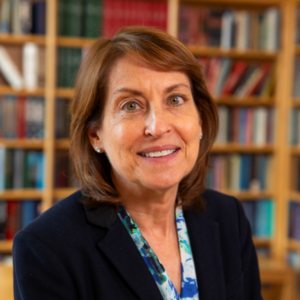
Lori Setton, PhD
Arthur Holly Compton Faculty Achievement Award
Lucy & Stanley Lopata Distinguished Professor of Biomedical Engineering
Chair, Department of Biomedical Engineering
McKelvey School Of Engineering
Setton is a dedicated educator, administrator, mentor, and scholar at the McKelvey School of Engineering, where she serves as the Lucy and Stanley Lopata Distinguished Professor and chair of the biomedical engineering department. Prior to joining WashU, she was the William Bevan Professor of Biomedical Engineering, Bass Fellow, and associate professor of orthopedic surgery at Duke University.
Setton’s research explores mechanisms that control drug delivery and tissue regeneration in the knee joints and spine. She combines methods from engineering and biology to discover new forms of pain relief for patients with osteoarthritis and lumbar disc degeneration. Her scholarship has received generous backing from the National Institutes of Health, the National Science Foundation, the Whitaker Foundation, and many other highly selective funders.
An enthusiastic champion of up-and-coming engineers, Setton is a key supporter of several university initiatives designed to harness young talent. These include the St. Louis Internship Program for Biomedical Engineering, the Inaugural Rising BME Scholars Regional Conference, and the new Center for Women’s Health Engineering.
Setton’s leadership within the broader field of engineering includes a term as president of the Biomedical Engineering Society from 2016 to 2018. She has been named a fellow of professional organizations such as the American Society of Mechanical Engineers, the American Institute for Medical and Biomedical Engineering, and the Orthopedic Research Society. For her many contributions to the profession Setton received the Van C Mow Medal in 2007 and HR Lissner Medal in 2022 from the American Society of Mechanical Engineers, and the Chris Jacobs Excellence in Leadership Award from the Biomedical Engineering Society in 2022.
Setton has been widely recognized for her achievements as an educator and researcher. In 1997, she was honored with the Presidential Early Career Award for Scientists and Engineers by the National Science Foundation. In addition, she has received numerous awards for her commitment to mentoring, including the Dean’s Award for Excellence in Mentoring from Duke University.
Setton earned a bachelor’s degree in mechanical and aerospace engineering from Princeton University in 1984. She went on to complete a master’s degree in mechanical engineering and biomechanics from Columbia University in 1988, followed by a doctorate at Columbia in the same field of study in 1993.

William G. Powderly, MD
Carl and Gerty Cori Faculty Achievement Award
J. William Campbell Professor of Medicine
Associate Dean for Clinical and Translational Sciences
Larry J. Shapiro Director, Institute for Public Health
Washington University School of Medicine In St. Louis
Powderly, MD, is a gifted administrator and educator whose scholarship and clinical practice address the ways in which social inequities amplify health disparities.
Powderly holds several prominent leadership positions at Washington University School of Medicine in St. Louis, including that of co-director of the Division of Infectious Diseases, where he oversees the department’s research enterprise, clinical operations, and educational programs. As the Larry J. Shapiro Director of the Institute for Public Health and director of the university’s Institute for Clinical and Translational Sciences, he leads efforts to build clinical and translational research from bench to bedside and beyond including community partnerships, economic and policy research, and influencing global health through scientific discovery.
Powderly completed his medical education at University College in Dublin in 1979 and a fellowship in infectious diseases at WashU in 1987. He joined the faculty at the School of Medicine and was promoted to Professor of Medicine in 1997, having been appointed as co-director of the Division of Infectious Diseases in 1995. In 2004 Powderly became dean of medicine and head of the School of Medicine at University College Dublin in Ireland, returning to WashU in 2013. In 2017, he served as president of the Infectious Diseases Society of America.
Powderly has studied HIV-related health issues for over 30 years, authoring more than 500 original manuscripts, reviews, and book chapters. The AIDS Foundation of St. Louis and the St. Louis Effort for AIDS are among many organizations that have formally recognized his research contributions.
His many honors include being named a fellow of the Royal College of Physicians of Ireland; of the Royal College of Physicians in London; of the Infectious Diseases Society of America; and of the American Association for the Advancement of Science.
In 2016, Washington University’s Academic Women’s Network recognized Powderly with the Pillar of Support Award. He received the Distinguished Graduate Award in 2019 from the University College Dublin Medical Graduates Association.